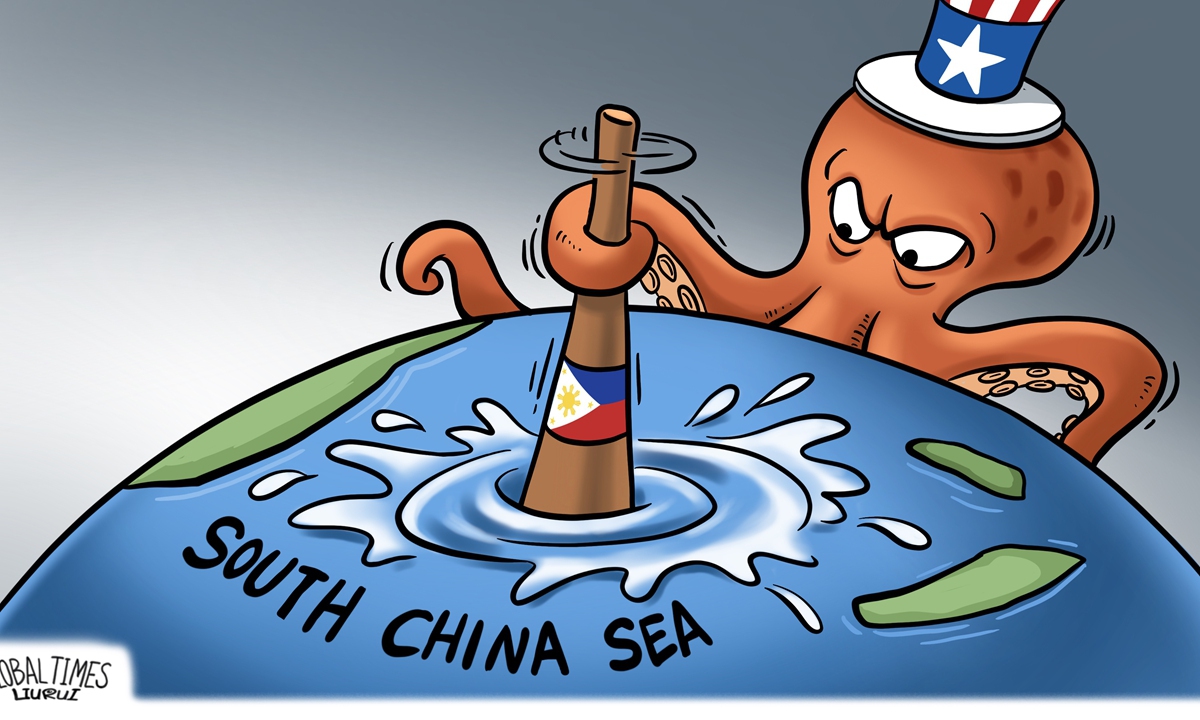Head-on blow from China awaits if US dares to provoke China’s core interests in the S.China Sea

Illustration:Liu Rui/GT
The US is not a littoral state of the South China Sea; it lies tens of thousands of kilometers away. However, the US has become the greatest destabilizing factor and challenge to the regional development of the South China Sea. As a potentially dangerous "time bomb," it continues to daydream about how to manipulate regional countries into confronting China.On Sunday, Karl Thomas, the US Navy's Seventh Fleet Commander who was in Manila for a port call, called out China's "aggressive behavior" in the South China Sea, referring to China Coast Guard vessels' lawful interception of Philippine ships that trespassed into waters near Ren'ai Reef of China's Nansha Islands on August 5. "You have to challenge people I would say operating in a grey zone," Thomas told Reuters.
That incident happened in early August and quickly festered under Washington's constant hype. Thomas's remarks prove that the US hopes to heat up this event again to continue provoking China-Philippine relations, with the aim of Manila fully aligning with Washington and becoming a front-runner in the US' strategic plan against China.
The current tensions in the South China Sea are mainly caused by the US' instigation, and such action of playing with fire is dangerous to the US.
The US has overestimated its own military capability, as well as the determination and confidence of its regional allies and partners to participate in its Indo-Pacific Strategy against China. How China and relevant countries solve the dispute is none of Washington's business. If the US dares to provoke China's core interests in the South China Sea, it will certainly face a head-on blow from China.
China's principle has been consistent and clear - we won't relinquish what is ours, nor do we desire any territory that does not belong to us. The US, however, is pulling in neighboring countries around China to flex its muscle and create tension in the region. Despite its efforts, it will never get what it wants, but will only create more instability in the region.
Washington's provocative behaviors pose a big obstacle to the resolution of the South China Sea disputes. The US continuously stirs up trouble in the hope of driving a wedge between China and its neighboring countries. Moreover, at a time when the consultations between China and ASEAN on a Code of Conduct in the South China Sea (COC) enter a critical stage, Washington is trying to mislead public opinion and hinder the process.
Last month, it was confirmed that the consultations on the COC have taken a positive direction, with China and regional countries completing the second reading of the draft text of the COC after four years of consultations. The Declaration on the Conduct of Parties in the South China Sea, signed by China and ASEAN in 2002, has determined some of the basic directions toward the resolution of the South China Sea issue, and the consultations on the COC now are making more specific efforts in this direction.
At present, all parties involved in the South China Sea issue should strengthen communication, and strive to adopt the COC as soon as possible. The disputes can only be handled in a reasonable, fair and proper manner by returning to such a track and eliminating the interference of external forces. Considering the complexity of the South China Sea issue, China has always advocated setting aside disputes and pursuing joint development. This is still the most realistic way to solve the issue, the most consistent with the interests of all parties, and the most feasible means of maintaining regional peace and stability.
The US continues to play up the "China threat" in the South China Sea to hijack ASEAN countries and make them treat China as an adversary rather than a partner for cooperation. It is clear that the US does not want to see peace in the South China Sea that is favorable to China and ASEAN, because otherwise, how can the US take advantage of the disputes to pursue its own interests?
For decades, ASEAN and the whole Asia-Pacific region have witnessed rapid economic development and prosperity, thanks to regional peace. Such a trend will certainly come to an abrupt end once the South China Sea becomes a region full of turbulence. When China and ASEAN countries urgently seek peaceful development, the US will have exerted every effort to stop it. Regional countries should stay vigilant.

